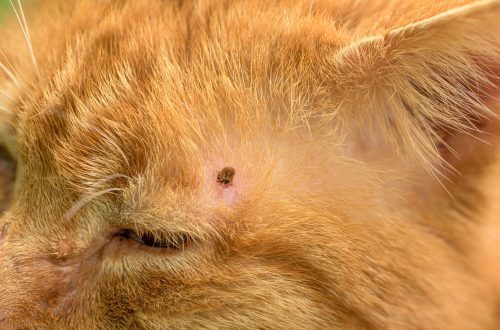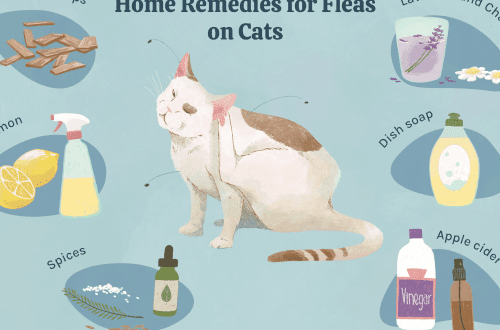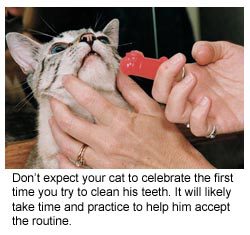
Cat breath odor: causes and what to do

Contents
- Cat Mouth Odor Essentials
- Causes of bad breath in cats
- Diseases of the oral cavity (soft tissues and teeth)
- Stuck food fragments and objects
- Dental plaque and tartar
- Diseases of internal organs (stomach, kidneys, esophagus, bronchi, lungs)
- Lymphocytic-plasmacytic stomatitis-gingivitis
- Endocrinological problem (diabetes mellitus)
- Replacement of temporary teeth with permanent ones
- Specific smell of food
- Types of bad smell
- Diagnostics
- What should I do if my cat has bad breath?
- Prevention
- Answers to frequently asked questions
Cat Mouth Odor Essentials
The smell from the mouth of a cat is not an independent disease, but only indicates a condition or disease (is a symptom)
In order to understand the situation, you need to establish what kind of smell comes from the mouth of the animal. This information will indicate the reason for its occurrence. If it’s not the smell of food, then you should contact the veterinarian
If the reason is insufficient oral hygiene, the doctor will conduct an initial sanitation, that is, cleansing, of the oral cavity and teach the owner to keep the cat’s mouth clean on their own
If the smell arose for another reason, the specialist will carry out a set of diagnostic measures: dental examination, x-ray, ultrasound, blood and urine tests – depending on the examination data and anamnesis (medical history compiled according to the owner)
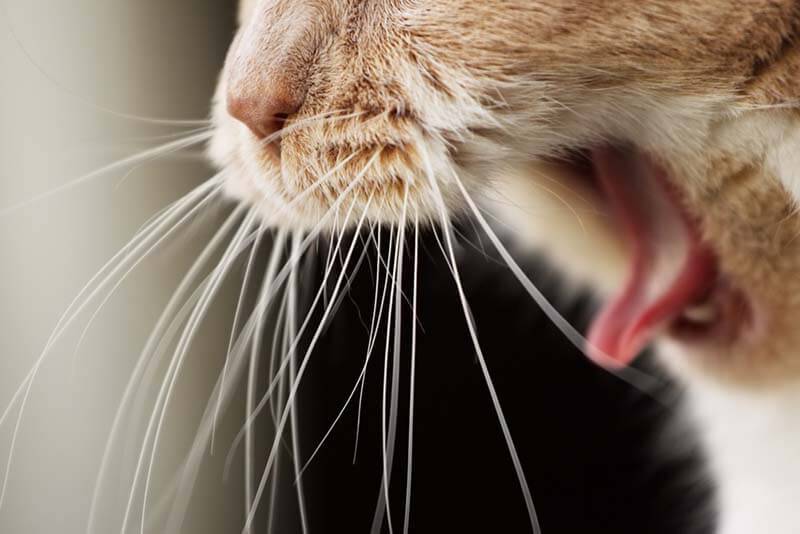
Causes of bad breath in cats
They can be very diverse. Sometimes the causes are associated with the disease (stomatitis, gingivitis, glossitis, pathologies of internal organs, diabetes mellitus), and sometimes they are physiological, that is, natural. The second category includes the smell of food after eating or the smell from the kitten’s mouth when changing teeth.
A separate item is the problem of oral hygiene. After all, if you do not brush your teeth, the formation of plaque and tartar is inevitable. This leads to the appearance of halitosis.
Diseases of the oral cavity (soft tissues and teeth)
Diseases of the oral cavity in cats can occur in isolation (stomatitis, gingivitis, glossitis, etc.), and can affect all of its structures. Sometimes they are the result of trauma, burns (physical, chemical), can be one of the symptoms of a systemic disease – infectious (calcivirosis, rhinotracheitis, leukemia, immunodeficiency, panleukopenia) or non-infectious (stomatitis caused by intoxication, renal failure). Pets, like people, have caries, problems with the gum pocket. It often happens that the tooth is sick, but looks healthy. Cats are very tolerant of chronic pain, but that doesn’t mean they don’t suffer from it.

Stuck food fragments and objects
A cat, unfortunately, cannot brush its teeth daily like a person, and therefore the sticking of small fragments of food happens regularly. When feeding homemade diets, fibers often get stuck between the teeth, and bones, scales, and other dense elements can even injure the soft tissues of the oral cavity. Often, a pet smells fishy from the mouth simply because a bone is stuck in its mouth. Threads and fragments of toys can remain between the teeth and injure the soft tissues of the oral cavity, causing inflammation, and, as a result, bad breath in a cat.
Dental plaque and tartar
The smell from the mouth of a cat can be the result of ordinary plaque or tartar that appears if oral hygiene is not followed.
Diseases of internal organs (stomach, kidneys, esophagus, bronchi, lungs)
Any systemic disease that causes intoxication, dehydration, and therefore an increase in the viscosity of saliva, a decrease in the barrier functions of the oral mucosa, and, as a result, bacterial overgrowth (uncontrolled reproduction of bacteria) can provoke the appearance of a strong bad breath in a cat.
In case of kidney diseases associated with a decrease in their function, when metabolic products accumulate in the animal’s body, the cat has a very bad breath of acetone.
Lymphocytic-plasmacytic stomatitis-gingivitis
This is a disease in which the body’s immune cells attack the tissues of the teeth and gums. As a result, it forms a focus of chronic inflammation with an unpleasant odor.
Endocrinological problem (diabetes mellitus)
With the development of diabetes, the cat’s metabolism changes. At the initial stage of the disease, the smell from the mouth can be bready, and as the problem develops, the smell of acetone becomes more and more pronounced.

Replacement of temporary teeth with permanent ones
In a kitten, bad breath can be a variant of the norm and accompany the process of changing the dentition. In place of each falling tooth, a wound is formed, which, if everything is in order, will heal itself, you just need to wait. A normal change of teeth should not be accompanied by any general symptoms.
Specific smell of food
The smell of cat food is often unpleasant for humans, and, accordingly, the smell from the mouth of an animal, in his opinion, will also be tasteless. Such a problem should be solved by itself some time after eating, or after mechanical cleaning of the teeth by the owner.
Types of bad smell
Fish smell
A cat’s mouth smells like fish most often after eating fish or fish food.
Putrefactive
The cat may smell like rotten meat from the mouth with injuries of the oral cavity, a problem with the teeth, if fragments of food or other foreign objects are stuck in the mouth. Neoplasms can also give a putrid odor. The kitten may have a smell of rot when changing temporary teeth with permanent ones.
Inflammation of the oral mucosa during infections and intoxication can also provoke the appearance of such a smell from the mouth in a cat.
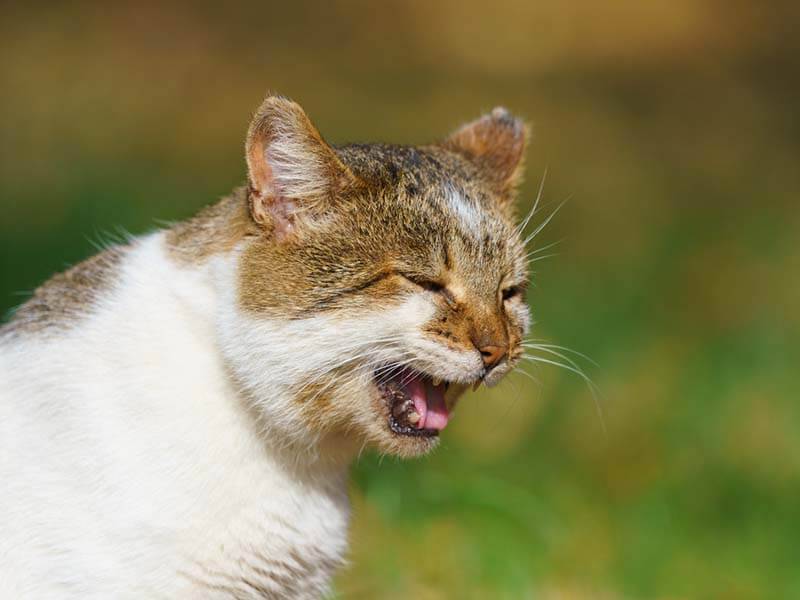
Ammonia
A similar smell often occurs with urinary retention, as well as diseases in which the kidneys cannot cope with their functions.
The smell of acetone
Often occurs in diabetic cats.
The smell of raw meat
Usually occurs in a kitten during a change of teeth. It can also appear with a fresh injury to the oral cavity, vomiting with blood, eating raw meat.
Diagnostics
If the cat stinks from the mouth, then the first thing the owner should do is to decide what kind of smell it is and inspect the pet’s oral cavity on their own. Perhaps you will find the cause – a stuck piece of food, an injured tooth, inflammation of the gums.
If the kitten smells like meat from his mouth, and his health is good, the baby has an excellent appetite, he is playful and cheerful, then most likely everything is in order, his teeth are just changing. In place of the fallen tooth, a wound is formed, which over time will heal itself. This is a natural process, you just need to wait.
If an unusual smell from the cat’s mouth is accompanied by poor health, weight loss, discharge from the eyes, refusal to feed, or you notice that she eats slowly, or she is salivating more than usual, then the animal needs to be seen by a specialist.
The veterinarian will first conduct a clinical examination of the pet, determine the temperature, weight, what shape the animal is in, and whether there is dehydration. Next, he examines the oral cavity, independently evaluates the smell from the mouth. Based on the results of these manipulations, a list of probable diagnoses and a diagnostic plan will be compiled.
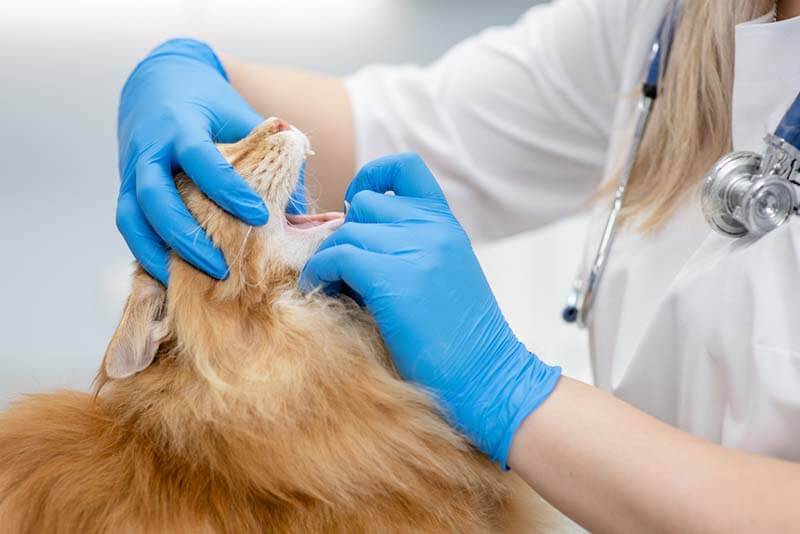
If the doctor suspected a dental problem, then the animal will need to be miorelaxed (immobilized). A full dental examination is always carried out while the animal is “sleeping”, because, being conscious, it will never allow an informative examination of the oral cavity. All teeth and gum pockets should be touched by a dentist with a special tool to make sure they are healthy. Ordinary visual inspection of the mouth usually does not give an accurate result. An x-ray may be required to establish a diagnosis.
If, after examination, the doctor is inclined to believe that the cause of halitosis lies in the disease of the internal organs, he will ask you additional questions. It will be important to understand whether the pet’s behavior, appetite, thirst, urination, and stool have changed. You will need information about vaccinations, treatments for parasites, and diet. Based on the results of the survey, an ultrasound examination, blood and urine tests (biochemical and general clinical) will be scheduled.
The infectious cause can be established using laboratory tests (ELISA or PCR). A complete blood count (CBC) will also be ordered by the doctor to confirm the infectious cause of the disease.
What should I do if my cat has bad breath?
There is no cure for halitosis. It is always a question of establishing the cause of its appearance and eliminating it, if possible, or alleviating the patient’s condition if complete recovery is excluded.
Accordingly, at home, the owner can independently remove a foreign object or a piece of food from the mouth, brush the cat’s teeth, change the food, if the problem is in its smell.
All other measures should be recommended by the doctor after the diagnosis is established.
Sometimes dental treatment is required, sometimes systemic antibiotic therapy, droppers, courses of injections or tablets. Topical gels and ointments may also be prescribed. If a cat’s breath stinks due to lymphocytic-plasmacytic stomatitis-gingivitis, often the only effective measure to combat the smell and pain will be the extraction of teeth (usually only fangs are left). Such a measure scares the owners, but the quality of life of a cat without pain in the mouth becomes much higher.
If we are talking about severe diseases of the internal organs (renal failure), intensive therapy may be required – droppers, injections, long-term outpatient treatment.
If, according to the results of the examination, diabetes mellitus is established, then a diet will be prescribed, drugs that normalize carbohydrate metabolism, possibly insulin.
If your cat has bad breath due to build-up of soft plaque or tartar, a professional cleaning by a veterinary dentist will help. It goes through several stages. First, the animal is immobilized in order to be able to work safely and effectively in the oral cavity with the instrument. Mechanically or with the help of ultrasound, plaque and calculus are removed, teeth that are only attached to the calculus are removed. Sanitation of cavities is carried out, wounds are sutured. Next, the surface of the teeth is polished with special pastes, and the animal is “wakened up”. The owner of such a pet will not be out of place to constantly maintain the resulting “beauty” – regularly brush his teeth at home.
If it is not possible to reliably find out why the cat’s breath stinks, and according to the results of the examination, the animal is healthy, then for a trial purpose it is possible to change the manufacturer of the food, the source of protein in it, the type or frequency of feeding.

Prevention
Of course, it is optimal to prevent the formation of a problem. If we talk about the smell from the mouth, first of all, you need to provide the basic needs of the animal.
What does it mean? The pet should not be chronically stressed, he should be given the opportunity to retire to a safe place with good visibility. Also, the cat needs to move enough, fully, but not excessively, eat, drink plenty.
Next, of course, you should pay attention to oral hygiene. No one is surprised that people brush their teeth twice a day. Cats also need to remove food particles and soft plaque from the mouth.
Each owner can learn how to carry out such a procedure at home himself. To do this, you can use a special cap brush that fits on your finger and toothpaste for cats. During the period of accustoming to cleaning, you can smear the gums of your pet with a delicious pate or malt paste, then he will be happy with the procedure.
The most important aspect in maintaining the health of our cats is medical examination. If you just make it a habit every year, when you come to the clinic for routine vaccination, to take a general and biochemical blood test, a general clinical urinalysis, this will help to identify a huge layer of problems at a very early stage. These measures prevent the appearance of an unpleasant odor.
Answers to frequently asked questions
January 24 2022
Updated: February 2, 2022





